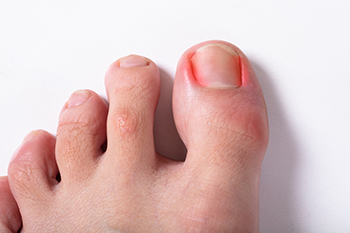
Ingrown toenails happen when the toenail grows into its surrounding skin. This can be uncomfortable, as the nail pierces the skin and becomes tender, red, and swollen. The big toe is the most often affected by this affliction, and if not tended to, it can bleed and become infected. If one is diabetic and has an ingrown toenail, they need to obtain immediate medical care as this can turn into a serious complication with their propensity towards infections and slower healing. To prevent ingrown toenails, it is important to cut toenails straight across rather than in a curved fashion, wear shoes that fit well and do not bind the toes in any way, and wear socks or other foot coverings to protect the feet. Examining the feet for excessive sweat or injury can help in the prevention of ingrown toenails as well. Wet feet can cause the toenails to soften, and it becomes easier for the nail to grow into the skin. Even a stubbed toe can cause a toenail to pierce the skin. If you develop an ingrown toenail, it is suggested that you make an appointment with a podiatrist who can provide the best treatment option for you.
Ingrown toenails can become painful if they are not treated properly. For more information about ingrown toenails, contact one of our podiatrists of New England Foot and Ankle. Our doctors can provide the care you need to keep you pain-free and on your feet.
Ingrown Toenails
Ingrown toenails occur when a toenail grows sideways into the bed of the nail, causing pain, swelling, and possibly infection.
Causes
- Bacterial infections
- Improper nail cutting such as cutting it too short or not straight across
- Trauma to the toe, such as stubbing, which causes the nail to grow back irregularly
- Ill-fitting shoes that bunch the toes too close together
- Genetic predisposition
Prevention
Because ingrown toenails are not something found outside of shoe-wearing cultures, going barefoot as often as possible will decrease the likeliness of developing ingrown toenails. Wearing proper fitting shoes and using proper cutting techniques will also help decrease your risk of developing ingrown toenails.
Treatment
Ingrown toenails are a very treatable foot condition. In minor cases, soaking the affected area in salt or antibacterial soaps will not only help with the ingrown nail itself, but also help prevent any infections from occurring. In more severe cases, surgery is an option. In either case, speaking to your podiatrist about this condition will help you get a better understanding of specific treatment options that are right for you.
If you have any questions please feel free to contact one of our offices located in Chelmsford and Newburyport, MA . We offer the newest diagnostic and treatment technologies for all your foot and ankle needs.
